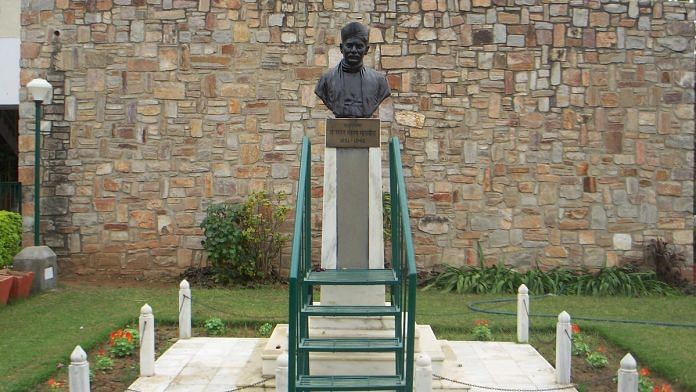On his birth anniversary, ThePrint takes a look at the life of Madan Mohan Malaviya, one of BJP’s chosen Congress leaders.
New Delhi: Educationist, lawyer, journalist, politician and social reformer — Madan Mohan Malaviya donned several hats.
From founding the Benares Hindu University (BHU) to reviving Hindustan Times, Malaviya made an immense contribution to the Indian independence movement.
In 2015, the Bharatiya Janata Party (BJP) decided to confer the Bharat Ratna on Malaviya for his extraordinary contribution to the country. Ever since, he has become one of BJP’s chosen icons among leaders who have seen neglect by their own Congress party. Prime Minister Narendra Modi paid homage to the Congress doyen Tuesday.
On his 157th birth anniversary, ThePrint takes a look at the life of Malaviya or ‘Mahamana’ as he was also known. ‘Mahamana’ was a title given to him by Nobel laureate Rabindranath Tagore for his dexterity in juggling various aspects of his life with ease and grace.
Early life of ‘Mahamana’
Born to an illustrious family on 25 December 1861, in Allahabad (now Prayagraj), Malaviya became a member of the Indian National Congress upon its inception.
In 1909, Malaviya, who was a lawyer, became the president of the Congress party. In 1918, he was elected to the Municipal Corporation of Allahabad, followed by an election to the Provincial Legislative Council, where he served for nearly three decades.
Malaviya was a champion of education for women and stood against the practice of dowry. When he founded the BHU in 1916, Malaviya managed a difficult feat — a donation from the tight-fisted Nizam of Hyderabad.
Even though he quit law practice when he joined politics, he returned to it in 1922 to defend those wrongly accused in the Chauri Chaura incident of 1919. Of the total 172 sentenced to be hanged, he managed to get 153 acquitted.
Also read: Periyar, the ‘South Indian Socrates’ who smashed Brahminical patriarchy
The moderate orthodox Hindu
In a commemorative volume in 1961, educationist J.B. Kripalani wrote, “Madan Mohan Malaviya had a passionate love of the country. He was thoroughly imbued with Indian culture. He often enlivened his talk and public speeches with quotations from the Ramayana, Mahabharata, Upanishads and the Geeta (sic).”
“His knowledge of Hinduism, if not scholarly, was adequate,” said Kripalani.
Malaviya is often described a moderate leader, ideally placed between the liberals and the conservatives. In a life lived much on the tenets of Enlightenment philosopher Immanuel Kant, Malaviya toed the line of tolerance in public, but didn’t accept food from the hands of a “non-Brahmins” in private.
The unique combination of “western wisdom and modern knowledge” along with the unwavering image of a “pious Pundit”, as Kripalani pointed out, is perhaps what made Malaviya particularly attractive to the BJP’s cause.
His “universal appeal” for both the princes and the masses, coupled with his orthodox Hindu beliefs that were practiced “without giving offence to other communities (sic)”, apart from his push for Dalit inclusion, gives the BJP its perfect icon in today’s India.
He believed that if Hinduism didn’t embrace Dalits, they might convert to other religions, a practice he abhorred.
“Our untouchables follow the Hindu religion, worship Rama, Krishna and other Hindu gods, take their meal after bath, and if wealthy, even build temples,” Malaviya was quoted as saying by political scientist Christophe Jaffrelot in his book Hindu Nationalism: A Reader.
“He started the Hindu Samaj (Hindu Society) in 1880 to defend the region’s Hindu festivals, in particular the yearly ‘Magh Mela’, which he felt was under threat on account of missionaries,” Jaffrelot writes.
Despite being a four-time Congress president, he also helped establish the Hindu Mahasabha in 1906 and revived it within the Congress in 1922.
His linguistic contribution resulted in the establishment of Hindi as a language for official purposes in courts and the bureaucracy alongside Urdu and Persian in the Oudh region of the colonial system.
Also read: Giani Zail Singh, the Indira Gandhi loyalist who remains India’s only Sikh president
Uneasy relationship with Muslims
Malaviya’s orthodoxy was a cause for concern for many Muslim leaders in pre-Independence India, who were often suspicious of him.
When Mahatma Gandhi launched the Khilafat movement, Malaviya opposed the move over fears that it might turn violent. In 1921, the Moplah uprising in Kerala, which assumed religious overtones, drew inspiration from the Khilafat movement.
In a presidential address to the Hindu Mahasabha in 1923, Malaviya reportedly said, “When the irresponsible element of Muslims will realise that we can react to the policy of tit for tat they would never venture to attack us.”
According to Jaffrelot, Malaviya went on to add, “I solemnly affirm before God I never mean to hurt Muslims or have the supremacy of Hindus over Muslims. If that be the sentiment in me, God may give me the greatest punishment, but I wish that my Hindu brethren be wiped off this earth if they cannot protect their sisters, daughters and others, cannot save the honour of our religion.”
“We are responsible for our weakness. We have forgotten our duty. We should not fight shy of being called Hindus.”
Journalistic life
Along with being an ardent orator and a successful Parliamentarian, Malaviya also wielded the pen with distinction.
From Hindustan Times in Delhi to The Leader and Abhyudaya in Allahabad, Malaviya was known for his outspoken views, especially against the British Raj. He rescued Hindustan Times from the brink of bankruptcy and was its chairman for over 20 years. He wrote on diverse set of subjects, from gender to media to justice.
After a distinguished career as a politician, including over five decades with the Congress party, he died on 12 November 1946.




Great son of India